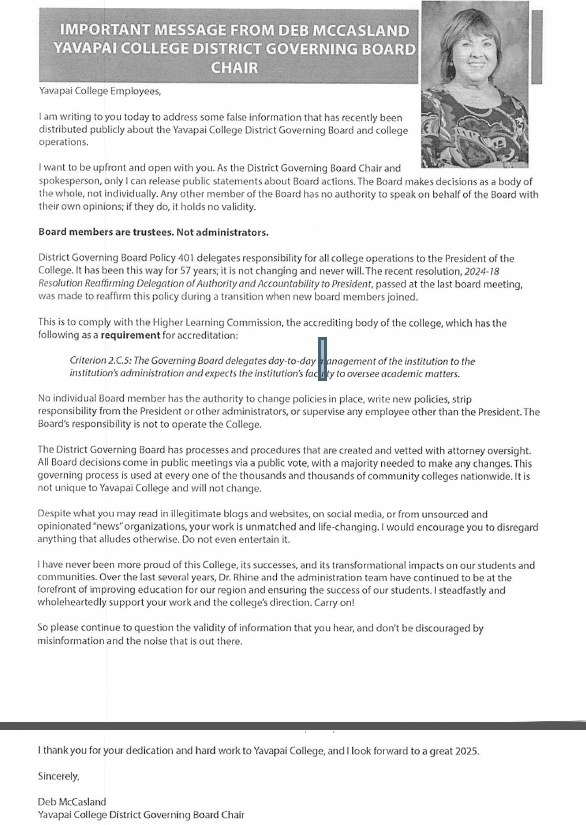Chair McCasland’s letter lacks clarity and substance while ignoring controversial Policy 310, which has resulted in numerous articles and comments raising concerns over chilling free speech by threatening to fire any of the 500 to 1,000 full or part-time College employees who dare to communicate with any Governing Board member

Robert E. Oliphant
OPINION: Yavapai Community College president, Dr. Lisa Rhine, recently forwarded a letter to the Community College’s staff and others written by Yavapai Community College District Governing Board Chair Deb McCasland. In the letter, McCasland warned about “false information” being publicly disseminated, claiming the misinformation was coming from “illegitimate blogs, websites, social media, and opinionated news organizations.”
The most obvious failure of the letter was this: At best it was extremely vague. It lacked any specifics about the alleged misinformation she claimed was being disseminated. It failed to identify any of the media sources she deemed unreliable. It provided no context whatsoever.
The glaring omissions in the letter cast significant doubt on the credibility and intent behind the claims. These omissions are especially troubling given her sweeping condemnation of the local news media—or is she even making such a condemnation? The lack of clarity leaves readers guessing.
When making such broad accusations, it seems to me that it is critical to identify the supposed false information and provide evidence to substantiate the broad claims being asserted. The letter should have named the various alleged “illegitimate blogs, websites, social media, and opinionated news organizations.” Without this information, the letter comes across as baseless and unhelpful. It is impossible to evaluate the validity of her warnings.
Notably, the letter sidestepped addressing the controversial Governing Board Policy 310, which has sparked significant commentary in the local news in recent weeks. Policy 310, enacted by a 4-1 vote of the outgoing Board in November, includes a contentious clause stating: “Under no circumstances should an individual Board member direct or contact by any means, a staff member concerning a college or community issue.” Critics, including this Blog, argue that this policy undermines the elected Board member’s role as representatives of Yavapai County taxpayers. It also reflects a troubling lack of trust in Board members and imposes what some see as an inappropriate or at least “chilling” restraint on free speech. The College disagrees.
Of interest, the letter written by McCasland briefly referenced Board Policy 401, a restatement of an existing policy that has not attracted notable controversy. By contrast, the ongoing public discussions and commentary have focused on Policy 310 and its implications.
Moreover, McCasland appeared determined to remind employees that President Rhine wielded nearly unchecked authority over them and anything classified by her as “operations.” However, McCasland’s remarks appeared to veer off course at times. She seemed to vaguely insinuate that the “misinformation” she mentioned in her letter was somehow tied to criticism of the staff’s exceptional work. Consider her statement:
“Despite what you may read in illegitimate blogs and websites, on social media, or from unsourced and opinionated ‘news’ organizations, your work is unmatched and life-changing. I would encourage you to disregard anything that alludes otherwise. Do not even entertain it.”
Yet, The Blog has found no recent articles publicly critical of staff. This statement, then, resembles what some might call a “red herring”—an attempt to mislead or distract. The fact is that recent commentary has been directed at the College’s executive leadership, particularly the troubling fixation on secrecy, suppression of free speech, and various financial and procurement practices.
In sum, Chair McCasland’ s decision to broadly dismiss criticism as “false information” without examples or context undermines her letter’s credibility. Instead of fostering transparency and addressing valid concerns, the letter appears to deflect attention away from legitimate issues while failing to provide clarity or constructive guidance.
The letter forwarded to staff and others by the president is found immediately below:

